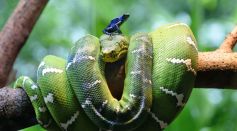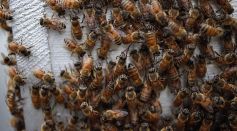ENVIRONMENT & CLIMATE

Inactions for Climate Change Will Cause Severe Impact to Humanity, New IPCC Report Says

Panda Captures Rolling Down In Viral Video; Why Are These Adorable Creatures So Clumsy?

Elephant Seals Have Map Sense That Works Like GPS to Ensure They Get Home to Give Birth

Tonga Underwater Volcano Eruption Breaks 2 Records Simultaneously — Dethrones Philippines' Mt. Pinatubo's Volcanic Plumes and Produces Major Lightning

Frog, Mice and Beetles Ride on a Snake's Back to Survive Flood After a Heavy Rainfall in Queensland
![Massive Hammerhead Shark Seen Swimming Next to Paddleboarders Off Palm Beach [WATCH]](https://d.sciencetimes.com/en/full/38736/massive-hammerhead-shark-seen-swimming-next-paddleboarders-off-palm-beach-watch.jpg?w=237&h=131&f=f69eca8cf24b50608a494649e0b9dafc)
Massive 13-Ft Hammerhead Shark Spotted Swimming Beneath Paddleboarders in Palm Beach [WATCH]

Chernobyl Nuclear Power Plant Spiked 20 Times Its Original Radiation After Captured by Russian Military

New "Armless" Dinosaur from Late Cretaceous Discovered in Northwest Argentina

Beavers in Alaska Multiply in Number, Transforming the Tundra Into Warmer, Greener Area

34 Million Years of Ancient Mammal Migration May Help Solve the Long-Lasting Mystery of ‘Lost Continent’

Fishermen Work Together to Release Sharks Attracted To Yellowtail, Trapped In Fishing Nets Near Famous Surfing Site in Cape Town [Watch]

Genomic Data Reveals the Biggest Human Ancestral Tree of 231 Million Lineages

Male Honeybees Experience Extreme Death Due To Heat Stress, Abdomen Bursts After Drones Spontaneously Ejaculate In Their Last Breath

Snake Catcher Bitten By a Venomous Black Mamba After Rescuing It, Dog Suffered The Same After Boomslang Encounter
Most Popular

Viruses vs Bacteria: Key Differences, How They Spread, and How We Treat Them

Recycling Myths vs Facts: What Actually Gets Recycled and How to Do It Right

What Is Conservation Biology? Key Strategies to Protect Species and Habitats

How Ice Cores Reveal Climate History: Insights from Paleoclimate Science and Ancient Data





